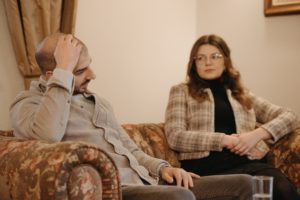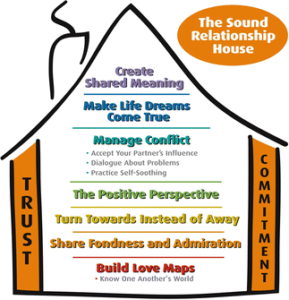
My Approach to Couples Therapy, Part 2
In Part One of this two-part series on my approach to couples therapy, I talked about how my approach differs from marriage counseling and relationship counseling.
In this post, I say more about the Gottman Method I use, and describe the process of couples therapy and what the therapy sessions look like.
The Gottman Method of Couples Therapy
The method developed by John and Julie Gottman is truly amazing. It’s informed by over forty years of research on what they call the disasters and the masters of relationships. They have learned what real couples, living happy lives together, do to create their happy lives together.
They’ve also learned what real couples do that lead to them either living unhappy, lonely, parallel lives together or ending their relationship and parting ways.
From their research, they formed a theory that serves as the recipe for creating a long, happy life together as a couple. It’s called the Sound Relationship House and includes nine essential ingredients for creating a long, happy relationship: trust, commitment, love maps, fondness and admiration, turning towards each other’s bids for connection, positive perspective, conflict management, making dreams come true, and shared meaning.

Their theory includes mixed-race couples, blended families, same-sex relationships as well as couples in which one or both partners were unfaithful, struggled with substance abuse, or had a history of trauma, anxiety, or depression.
Couples Therapy: The Process
First Three Therapy Sessions: A Thorough Assessment
Unlike most marriage and relationship counseling approaches, the Gottman Method begins with a thorough assessment of the couple’s relationship. The assessment takes three 90-minute sessions to complete.
First Session
In the first session, I interview the couple together. We get acquainted. I learn what led to them seeking couples therapy. I also learn a bit about their individual backgrounds and their relationship.
After this session, I register the couple to do The Gottman Relationship Checkup. It’s a set of questionnaires that allows each partner to tell me a lot, in a short amount of time, about themselves and their point of view of their relationship.
The Checkup takes about an hour and a half to complete. Later, the couple will do the questionnaire again and see the progress they’ve made doing couples therapy.
Second Session
The second session is in two parts. I interview the partners individually for 45 minutes. In this session, I learn more about them as individuals. It’s also an opportunity to share things they thought of after the first session or weren’t comfortable saying in the first session with their partner present.

Third Session
In the third session, I do two things. First, I present a distilled summary of the two interviews and the couple’s answers to the Relationship Checkup. I review these to verify my understanding of both partners and their relationship. When needed, I revise my understanding according to their responses to what I say.
After they verify my understanding of the assessment results, I present a proposed plan of care for improving their relationship. It’s a proposed plan because it’s open to the couple’s revision when I missed something that’s important to them. For example, I might have missed how stressful interactions with one partner’s parents are. They want help with that, so I add it to the plan of care.
This completes the thorough assessment of the couple’s relationship. With the next session, the three of us get to work on creating a happier relationship for them.
What Couples Therapy Care Plan Sessions Look Like

The assessment sessions are 90-minutes each. So are the care plan sessions. Couples therapy care plan sessions take longer than individual sessions because I’m working with a couple instead of an individual.
Care plan sessions are usually weekly at first. In these sessions, the three of us review how the couple did the previous week. If I gave them homework to do, usually practicing new communication skills, we go over how it went and do further work if needed. We also process any arguments they had since their last lesson.
I also introduce new practices in these sessions for the couple to use in session. They use them to talk with each other about real issues in their relationship. They then apply the skill at home for the upcoming week.
Learning New Ways of Relating as A Couple
The care plan sessions require couples to learn new ways of relating to each other. These new ways help them take better care of their relationship. However, learning these new ways takes attention, intention, and practice.
They seem odd and awkward at first. After couples get used to them, they don’t go back to their old, harmful ways of interacting. They continue using them as they move forward in a happier life together.
Wrapping Up
When the couple has achieved their goals, we schedule their final session. Their final session is primarily about relapse prevention. Many couples, within two years of ending couples therapy, relapse back to where they were before they started therapy. It’s important for them to know how to use the skills they’ve learned to prevent relapse.
Part of relapse prevention is scheduling sessions at 6, 12, and 18 months after their wrap-up session. We then part ways with the couple knowing that I remain available to them. If something happens and they need to come in for a session or two, they can.
For more information or to schedule a FREE 30-Minute Initial Consult, visit my website. I look forward to talking with you. https://markwneville.com/marriage-counseling-couples-therapy/




